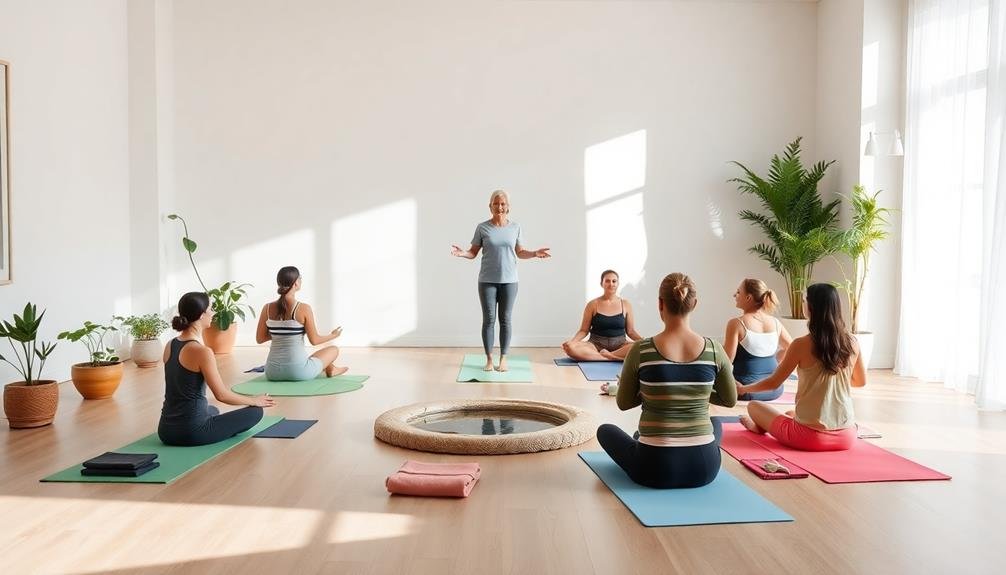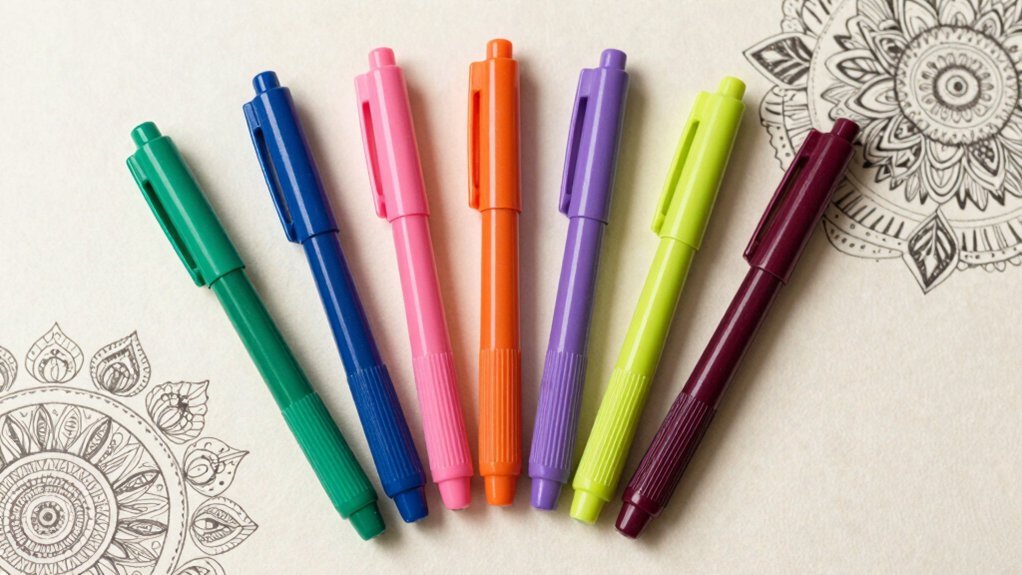You'll find solace and professional growth in these 10 gentle yoga teacher training programs designed specifically for anxious souls. Programs like Mindful Movement Academy and Breath-Centered Yoga Institute focus on mindfulness and pranayama techniques. The Restorative Flow Certification and Yin Yoga Immersion offer specialized training in calming practices. For trauma-informed approaches, consider the Trauma-Informed Yoga Teacher Training or Adaptive Yoga Teaching Certification. The Gentle Hatha Yoga School and Stress-Relief Yoga Instructor Program provide extensive training in anxiety-reducing methods. Compassionate Yoga Leadership Training rounds out the list, emphasizing empathy and inclusivity. Explore these options to discover your perfect path to becoming a gentle yoga instructor.
Key Takeaways
- Mindful Movement Academy offers a 200-hour program focusing on mindfulness techniques and gentle asanas for anxiety management.
- Breath-Centered Yoga Institute provides pranayama-focused training, emphasizing anxiety-reducing breathing techniques.
- Trauma-Informed Yoga Teacher Training specializes in creating safe spaces for students with trauma experiences.
- Adaptive Yoga Teaching Certification trains instructors to make yoga accessible for all bodies and abilities.
- Stress-Relief Yoga Instructor Program equips teachers with tools for guiding students through calming, restorative practices.
Mindful Movement Academy

Serenity awaits at Mindful Movement Academy, a premier gentle yoga teacher training program. You'll find a nurturing environment designed to support anxious souls on their journey to becoming yoga instructors. This academy focuses on mindfulness techniques and gentle asanas, ensuring you feel comfortable and confident throughout your training.
The program spans 200 hours, divided into manageable modules that cater to your individual pace. You'll learn the fundamentals of gentle yoga, including modifications for various physical limitations and anxiety-reducing breathing exercises.
The academy's experienced instructors guide you through anatomy, philosophy, and teaching methodology, all tailored to the gentle yoga approach. You'll practice teaching in a supportive setting, receiving constructive feedback to refine your skills.
The academy also offers workshops on managing anxiety in class settings, both for yourself and future students. Upon completion, you'll be equipped with the knowledge and confidence to lead gentle yoga classes.
Mindful Movement Academy's gentle yoga teacher training provides a solid foundation for your teaching career while prioritizing your mental well-being. You'll graduate feeling empowered to share the healing benefits of gentle yoga with others.
Breath-Centered Yoga Institute

At the Breath-Centered Yoga Institute, you'll find a pranayama-focused curriculum that emphasizes the power of breath in gentle yoga practice.
You'll learn anxiety-reducing breathing techniques that can help your future students manage stress and find calm.
The program also integrates mindful movement, teaching you how to seamlessly blend breath work with gentle poses for a holistic approach to yoga instruction.
Pranayama-Focused Curriculum
The Breath-Centered Yoga Institute offers a unique pranayama-focused curriculum for aspiring gentle yoga teachers. You'll dive deep into the science and art of breath control, learning how to harness the power of pranayama to calm anxious minds and bodies.
This extensive program equips you with the tools to guide your future students through various breathing techniques, helping them manage stress and cultivate inner peace.
Throughout the training, you'll explore:
- The physiological effects of different pranayama practices on the nervous system
- Techniques for adapting breath work for individuals with anxiety or respiratory issues
- The integration of pranayama with gentle asana sequences
- Methods for creating a safe and nurturing environment for breath-centered practices
You'll practice teaching pranayama in a supportive setting, receiving feedback from experienced instructors and peers.
The curriculum also covers the history and philosophy of pranayama, ensuring you understand its roots and significance in yoga tradition.
Anxiety-Reducing Breathing Techniques
Frequently, the Breath-Centered Yoga Institute's program emphasizes anxiety-reducing breathing techniques as a cornerstone of gentle yoga practice.
You'll learn to guide your students through various calming breath exercises, such as diaphragmatic breathing, alternate nostril breathing, and extended exhale breathing. These techniques help activate the parasympathetic nervous system, reducing stress and promoting relaxation.
You'll discover how to teach the 4-7-8 breath, a powerful tool for managing anxiety. This involves inhaling for 4 counts, holding for 7, and exhaling for 8.
You'll also explore box breathing, where you inhale, hold, exhale, and hold again for equal counts. These methods can be easily incorporated into daily life, providing your students with practical coping strategies.
The program will train you to recognize signs of anxiety in your students and adapt your teaching accordingly.
You'll learn to create a safe space for anxious individuals, using gentle cues and offering modifications.
Mindful Movement Integration
Breath-Centered Yoga Institute's program seamlessly integrates mindful movement with breath awareness, enhancing your ability to teach gentle yoga effectively.
You'll learn to guide students through slow, deliberate movements that synchronize with their breath, promoting a deeper mind-body connection. This approach helps anxious individuals feel more grounded and present in their practice.
The program emphasizes four key principles of mindful movement integration:
- Awareness: Cultivating a heightened sense of bodily sensations and breath patterns
- Intention: Setting a clear purpose for each movement and breath cycle
- Alignment: Ensuring proper body positioning to maximize safety and effectiveness
- Flow: Creating smooth shifts between poses that maintain a steady breath rhythm
You'll practice cueing techniques that encourage students to move mindfully, focusing on the present moment rather than worrying about perfecting poses.
By incorporating gentle shifts and holding poses for longer durations, you'll learn to create a calming atmosphere that supports anxiety reduction.
The program also covers adapting movements for different ability levels, ensuring your classes remain accessible and inclusive for all students.
Restorative Flow Certification Program

Over the course of 200 hours, you'll explore deep into the art of restorative flow yoga through our thorough certification program. This immersive experience will equip you with the skills to guide students through gentle, fluid sequences designed to release tension and promote relaxation.
You'll learn to create seamless shifts between restorative poses, incorporating breath work and meditation techniques. The program covers anatomy, physiology, and the nervous system's response to stress, enabling you to understand how restorative flow benefits your students' overall well-being.
You'll practice cueing and adjusting for various body types and limitations, ensuring your classes are inclusive and accessible. The curriculum includes hands-on experience in prop usage, sequence design, and creating a nurturing environment for your students.
Throughout the training, you'll develop your own restorative flow style, blending traditional yoga principles with modern relaxation techniques. You'll also learn business essentials, including marketing your classes and building a sustainable yoga career.
Upon completion, you'll be certified to teach restorative flow yoga, armed with the knowledge and confidence to support anxious students in finding peace through gentle movement.
Trauma-Informed Yoga Teacher Training

Our Trauma-Informed Yoga Teacher Training program equips you with the specialized skills to create safe, supportive spaces for students who've experienced trauma.
You'll learn to recognize signs of trauma, understand its impact on the body and mind, and develop strategies to help students feel secure and empowered during their practice.
This extensive training covers essential topics such as:
- The neurobiology of trauma and its effects on the nervous system
- Trauma-sensitive language and cueing techniques
- Modifications for common yoga poses to avoid triggering reactions
- Creating a trauma-informed class environment and structure
You'll gain hands-on experience through practice teaching sessions, case studies, and role-playing exercises.
We'll explore the importance of establishing clear boundaries, obtaining consent, and offering choices throughout the class.
You'll also learn self-care techniques to prevent burnout and maintain your own emotional well-being while working with trauma survivors.
Gentle Hatha Yoga School

The Gentle Hatha Yoga School offers a thorough 200-hour teacher training program designed for aspiring instructors who want to specialize in slower-paced, accessible yoga practices.
You'll learn to create safe, nurturing environments for students of all abilities, with a focus on gentle postures, breathwork, and meditation techniques.
The curriculum covers anatomy, alignment principles, and modifications for common injuries and conditions.
You'll explore the philosophy and history of yoga, delving into classical texts and their modern applications.
The program emphasizes hands-on teaching experience, allowing you to practice cueing, adjustments, and sequencing in a supportive setting.
You'll also learn about the business aspects of teaching yoga, including marketing, ethics, and studio management.
The school's experienced instructors will guide you through creating lesson plans, developing your teaching voice, and building confidence in your abilities.
Upon completion, you'll be equipped to lead gentle yoga classes for diverse populations, including seniors, pregnant women, and those with mobility challenges.
The Gentle Hatha Yoga School's training prepares you to share the healing benefits of yoga with students who may feel intimidated by more vigorous styles.
Anxiety-Aware Vinyasa Training

You'll learn to create mindful movement sequences that support anxious students in Anxiety-Aware Vinyasa Training.
You'll master breathing techniques to cultivate calm and grounding during practice.
You'll also develop trauma-sensitive cueing approaches to guarantee a safe and supportive environment for all participants.
Mindful Movement Sequences
Gentle yoga teacher training programs explore mindful movement sequences as part of anxiety-aware vinyasa training.
You'll learn to create flows that prioritize breath awareness, body sensations, and present-moment focus. These sequences aim to reduce anxiety by encouraging a meditative state through slow, deliberate movements.
As you develop your skills, you'll discover how to design sequences that:
- Emphasize grounding poses to promote stability and security
- Incorporate gentle twists and forward folds to release tension
- Use restorative postures to activate the parasympathetic nervous system
- Integrate mindful shifts to maintain a continuous state of awareness
You'll practice cueing techniques that guide students' attention to their breath and bodily sensations, helping them stay present and connected.
You'll also learn to offer modifications and props to support anxious students, ensuring they feel safe and comfortable throughout the practice.
Breathing Techniques for Calm
Several breathing techniques form a cornerstone of anxiety-aware vinyasa training in gentle yoga teacher programs.
You'll learn to guide students through calming breaths that can help manage anxiety and promote relaxation. The foundation begins with diaphragmatic breathing, where you'll teach students to breathe deeply into their belly, expanding it on inhale and contracting on exhale.
Next, you'll explore the 4-7-8 breath technique. This involves inhaling for four counts, holding for seven, and exhaling for eight. It's an effective tool for quickly reducing stress and anxiety.
You'll also learn about alternate nostril breathing, a practice that balances the left and right hemispheres of the brain and promotes a sense of calm.
Box breathing is another technique you'll master. This method involves equal counts for inhale, hold, exhale, and hold, typically for four counts each. It's particularly useful for grounding anxious students.
Trauma-Sensitive Cueing Approaches
Trauma-sensitive cueing approaches form a critical component of anxiety-aware vinyasa training in gentle yoga teacher programs.
You'll learn to create a safe space for students who may have experienced trauma or struggle with anxiety. This approach emphasizes choice, empowerment, and non-judgmental language.
When cueing, you'll focus on:
- Using invitational language: "If you'd like, you can…" instead of "You should…"
- Offering options: Providing multiple variations for each pose
- Avoiding touch without explicit consent: Verbal cues take precedence over hands-on adjustments
- Emphasizing present-moment awareness: Encouraging students to notice sensations without judgment
You'll practice using descriptive language that guides students into poses without triggering anxiety.
Instead of saying "relax," which can be challenging for anxious individuals, you'll learn to cue specific body parts and actions. For example, "Allow your shoulders to soften away from your ears."
Yin Yoga Immersion Course

Many teacher training programs now offer specialized Yin Yoga immersion courses. These in-depth programs focus on the slow-paced, meditative style of Yin Yoga, which targets the body's connective tissues. You'll learn to hold passive poses for extended periods, typically 3-5 minutes, to increase flexibility and promote relaxation.
During the immersion, you'll study the principles of Yin Yoga, including its emphasis on stillness and surrender. You'll explore the anatomy and physiology behind this practice, understanding how it affects fascia, joints, and the nervous system. The course will teach you to sequence Yin classes, modify poses for different body types, and use props effectively.
Here's what you can expect from a Yin Yoga immersion:
| Day | Practice | Theory | Self-Reflection |
|---|---|---|---|
| 1 | Foundations | Yin principles | Personal practice |
| 2 | Targeted poses | Anatomy | Journaling |
| 3 | Sequencing | Meridian theory | Meditation |
| 4 | Teaching practicum | Class design | Integration |
Adaptive Yoga Teaching Certification

Adaptive Yoga Teaching Certification programs offer specialized training for instructors who want to make yoga accessible to all bodies and abilities.
These courses equip you with the knowledge and skills to modify poses, use props effectively, and create inclusive classes for students with diverse physical limitations or disabilities.
You'll learn to work with individuals facing challenges such as:
- Mobility issues
- Chronic pain conditions
- Neurological disorders
- Age-related limitations
During the certification, you'll explore anatomy, biomechanics, and common health conditions.
You'll practice hands-on adjustments, develop verbal cuing techniques, and design sequences tailored to specific needs.
The training often includes modules on chair yoga, bed yoga, and working with assistive devices.
You'll gain confidence in adapting traditional poses and creating new variations to suit different body types and abilities.
The certification also covers safety considerations, trauma-informed teaching, and effective communication strategies for working with diverse populations.
Stress-Relief Yoga Instructor Program

Stress-Relief Yoga Instructor Programs equip you with the tools to guide students through calming, restorative practices designed to combat daily stressors.
These specialized courses focus on teaching you gentle yoga techniques, breathing exercises, and meditation practices that effectively reduce anxiety and promote relaxation.
You'll learn to create soothing class environments, use appropriate language, and develop sequences that address common stress-related issues.
The program covers anatomy and physiology related to stress responses, helping you understand how yoga can positively impact the nervous system.
You'll explore various stress-relief props and their applications, such as bolsters, blankets, and eye pillows.
The training also emphasizes the importance of mindfulness and how to incorporate it into your teaching style.
As part of the curriculum, you'll study stress management techniques beyond yoga, including time management and lifestyle adjustments.
This holistic approach allows you to offer extensive support to your future students.
Upon completion, you'll be prepared to lead stress-relief yoga classes in various settings, including corporate environments, wellness centers, and private sessions.
You'll have the skills to help others find balance and peace in their hectic lives.
Compassionate Yoga Leadership Training

Compassionate Yoga Leadership Training takes your teaching skills to the next level by focusing on empathy, inclusivity, and ethical leadership.
You'll learn to create a safe, welcoming environment for all students, regardless of their background or ability level. This program emphasizes the importance of emotional intelligence and effective communication in yoga instruction.
Throughout the training, you'll develop strategies to address common challenges in yoga classes, such as anxiety, body image issues, and physical limitations.
You'll also explore the ethics of yoga teaching, including appropriate touch, maintaining professional boundaries, and respecting cultural sensitivities.
The core principles of Compassionate Yoga Leadership include:
- Cultivating self-awareness and personal growth
- Practicing active listening and empathetic communication
- Adapting teaching methods to accommodate diverse needs
- Fostering a supportive community within your classes
Frequently Asked Questions
How Do I Overcome My Own Anxiety While Teaching Yoga Classes?
To overcome anxiety while teaching yoga, focus on deep breathing and grounding techniques before class. Practice your sequence thoroughly, remind yourself of your expertise, and connect with your students. Remember, they're there to learn from you, not judge you.
What's the Best Way to Market Myself as a Gentle Yoga Teacher?
To market yourself as a gentle yoga teacher, highlight your calming approach. Create a soothing online presence, offer free mini-sessions, and partner with wellness centers. You'll attract students by emphasizing stress relief and accessibility in your classes.
Can I Specialize in Gentle Yoga if I'm Not Naturally Flexible?
You can absolutely specialize in gentle yoga without being naturally flexible. Focus on creating a nurturing environment, understanding modifications, and emphasizing breath work. Your empathy and teaching skills matter more than your personal flexibility in this style.
How Do I Handle Students Who Push Themselves Too Hard in Class?
You'll need to address overzealous students directly. Remind them that yoga isn't about pushing limits. Encourage them to listen to their bodies, emphasize proper alignment, and offer modifications. Always prioritize safety over achieving difficult poses.
Are There Specific Insurance Considerations for Teaching Anxiety-Focused Yoga Classes?
You'll need specialized liability insurance for anxiety-focused yoga classes. It should cover mental health-related claims. Consult an insurance broker who understands the unique risks of teaching anxious students. Don't forget to document your qualifications thoroughly.
In Summary
You've explored ten wonderful options for gentle yoga teacher training programs tailored to anxious individuals. Whether you're drawn to mindful movement, breath work, or trauma-informed practices, there's a program that'll suit your needs. Remember, becoming a yoga teacher isn't just about mastering poses; it's about cultivating compassion and understanding. By choosing one of these programs, you'll be well-equipped to guide others on their journey to inner peace and physical well-being. Take the leap and start your teaching path today!





Leave a Reply